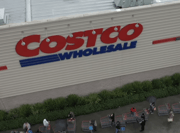Are your favorite stores on the boycott list this April 18?
By
Veronica E.
- Replies 10
Many of us have a routine when it comes to where and how we shop—sticking to familiar stores, trusted brands, and the convenience of one-stop destinations.
But now, some shoppers across the country are being asked to pause and rethink that routine, even if just for a few days.
A consumer-led movement is urging Americans to temporarily shift their spending away from large retailers and instead support small, local businesses.
Set to begin April 18, this coordinated boycott—described as an "economic blackout"—has sparked conversations about the impact of our everyday purchases and how they reflect the values we support.

Who is organizing this?
The movement is being led by a group called People's Union USA, a consumer advocacy organization focused on corporate accountability.
According to its founder, John Schwarz, the group is calling for a three-day economic blackout from April 18 to April 20.
During this time, consumers are being asked not to shop at major chain stores or online giants.
Instead, they’re encouraged to support independently owned businesses in their communities.
What’s behind the boycott?
People's Union USA says the goal is to send a message to large corporations accused of tax avoidance, unfair pricing practices, and cutting back on workplace diversity and inclusion initiatives.
In a previous statement, Schwarz said the group aims to raise awareness about “the larger truth that most Americans already feel—that these corporations do not pay their fair share in taxes. They exploit families, crush small businesses, and continue to profit off inequality and economic control.”
Also read: Stay informed: How the nationwide economic blackout on February 28 may impact your favorite stores
Companies mentioned on the group’s website include familiar names such as:
Also read: The power of the purse: What’s happening with Nestlé, Target, and Amazon?
Why this weekend?
The timing is intentional.
Easter weekend often sees a rise in consumer spending, and the group hopes this makes the boycott more noticeable.
The idea is that by reducing sales during a peak shopping period, consumers can show companies that values matter—and that people are paying attention.
Will it make a difference?
While one person skipping a store visit might not seem like much, supporters of the blackout believe that collective action can have a lasting impact.
These types of movements aren’t new, but they’re gaining traction in today’s digital age, where ideas and organizing efforts can spread quickly.
Even if large companies don’t change overnight, these actions can raise public awareness, generate media attention, and inspire long-term changes in buying behavior.
For those who shop with major retailers, this weekend may bring some conversations or questions about where we choose to spend and why.
Some may explore alternatives like local stores or markets, while others may stick with their usual routines.
Either way, moments like these often spark broader discussions about consumer habits and the role they play in the economy.
Read next: Boycott begins at Target amid concerns over rising checkout costs

Have you ever taken part in a boycott before? Do you think spending power can really drive change? What are your go-to local businesses that deserve more love? We’d love to hear your thoughts in the comments. Let’s talk about the choices we make, the values they reflect, and the power we have—together!
But now, some shoppers across the country are being asked to pause and rethink that routine, even if just for a few days.
A consumer-led movement is urging Americans to temporarily shift their spending away from large retailers and instead support small, local businesses.
Set to begin April 18, this coordinated boycott—described as an "economic blackout"—has sparked conversations about the impact of our everyday purchases and how they reflect the values we support.

Retailers large and small could feel the effects of this weekend's planned spending pause. Image Source: Pexels / CBS 8 San Diego.
Who is organizing this?
The movement is being led by a group called People's Union USA, a consumer advocacy organization focused on corporate accountability.
According to its founder, John Schwarz, the group is calling for a three-day economic blackout from April 18 to April 20.
During this time, consumers are being asked not to shop at major chain stores or online giants.
Instead, they’re encouraged to support independently owned businesses in their communities.
What’s behind the boycott?
People's Union USA says the goal is to send a message to large corporations accused of tax avoidance, unfair pricing practices, and cutting back on workplace diversity and inclusion initiatives.
In a previous statement, Schwarz said the group aims to raise awareness about “the larger truth that most Americans already feel—that these corporations do not pay their fair share in taxes. They exploit families, crush small businesses, and continue to profit off inequality and economic control.”
Also read: Stay informed: How the nationwide economic blackout on February 28 may impact your favorite stores
Companies mentioned on the group’s website include familiar names such as:
- Walmart
- Nestlé
- Monsanto (now Bayer)
- Coca-Cola
- Chevron
- Nike
- Meta
- Comcast
- McDonald's
Also read: The power of the purse: What’s happening with Nestlé, Target, and Amazon?
Why this weekend?
The timing is intentional.
Easter weekend often sees a rise in consumer spending, and the group hopes this makes the boycott more noticeable.
The idea is that by reducing sales during a peak shopping period, consumers can show companies that values matter—and that people are paying attention.
Will it make a difference?
While one person skipping a store visit might not seem like much, supporters of the blackout believe that collective action can have a lasting impact.
These types of movements aren’t new, but they’re gaining traction in today’s digital age, where ideas and organizing efforts can spread quickly.
Even if large companies don’t change overnight, these actions can raise public awareness, generate media attention, and inspire long-term changes in buying behavior.
For those who shop with major retailers, this weekend may bring some conversations or questions about where we choose to spend and why.
Some may explore alternatives like local stores or markets, while others may stick with their usual routines.
Either way, moments like these often spark broader discussions about consumer habits and the role they play in the economy.
Read next: Boycott begins at Target amid concerns over rising checkout costs
Key Takeaways
- The People's Union USA is organizing a total economic blackout starting April 18, urging people to boycott major retailers and only shop with local, independent businesses.
- The boycott follows accusations against major corporations of tax avoidance, price hikes, and rolling back DEI initiatives, and aims to impact their reputation and revenues.
- A list of specific companies to avoid during the boycott is published on the People's Union USA website, including large corporations like Amazon and Walmart.
- The economic blackout is seen as a demonstration of consumer power and a call for corporate accountability in terms of fair tax contributions and support for communities.
Have you ever taken part in a boycott before? Do you think spending power can really drive change? What are your go-to local businesses that deserve more love? We’d love to hear your thoughts in the comments. Let’s talk about the choices we make, the values they reflect, and the power we have—together!






